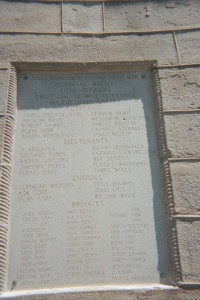You’ve likely never heard of any of them. They did nothing special–other than put their lives or reputations on the line, eagerly or reluctantly. I’m talking about my two dozen or so ancestors who participated in one way or another in the American Revolution.
One of them, Jabez Beers, died in the war. He was fifty-three when he and about two hundred others lost their lives at the Battle of Wyoming (Pennsylvania) on July 3, 1778. Part of the battle marker is shown here. It was an ugly fight near Wilkes-Barre that also resulted in the death of a son-in-law. Another ancestor who survived, Ishmael Bennett, married Jabez’s widowed daughter fiv e years later.
e years later.
Then there were the Taylors of Connecticut, Nathen, born in 1682, and a grandson, John, born in 1754. I’m not sure what happened to the generation in between, but the Taylor men went off together to the Connecticut Line. Both returned safely, though Nathen didn’t live to the end of the war (he died in 1782, when he was one hundred).
The Revolutionary War ancestor I’d most like to meet is Nathaniel Chatterton, a man who wrestled with demons. He was indicted for “adhering to the enemy” in 1780 when he was twenty-five. Still, he ended up fighting on the colonial side in the Connecticut Line at the Battle of Yorktown a year later. He married a widow, Mary (Manning) Storm, in Dutchess County, New York, two years after the war ended. Three years later, he was tried for assault and running a disorderly tavern. Sometime after 1790, they and their children moved across the border to what is now the Lacolle, Quebec, area along with many of their neighbors and many of Mary’s brothers and their families. Nathaniel died in 1835, just over the U.S. border in Vermont; Mary lived out her days in Quebec, dying in 1855 at the age of one hundred and four.
I won’t go into all the other stories here. My point is that some of those early patriots were people just like us. Some were gung-ho, pro-Revolution; others sat in taverns and proclaimed a pox on both sides but ended up going to war anyway. Many focused on their families and their crops and their businesses and stayed out until they were given no choice. Does that make them any less “American”? I think not. For it is that freedom to grouse and disagree privately or publicly without fear of imprisonment or worse that I treasure most about our country. And I daresay, if you had pressed my ancestors on it, they would have agreed.